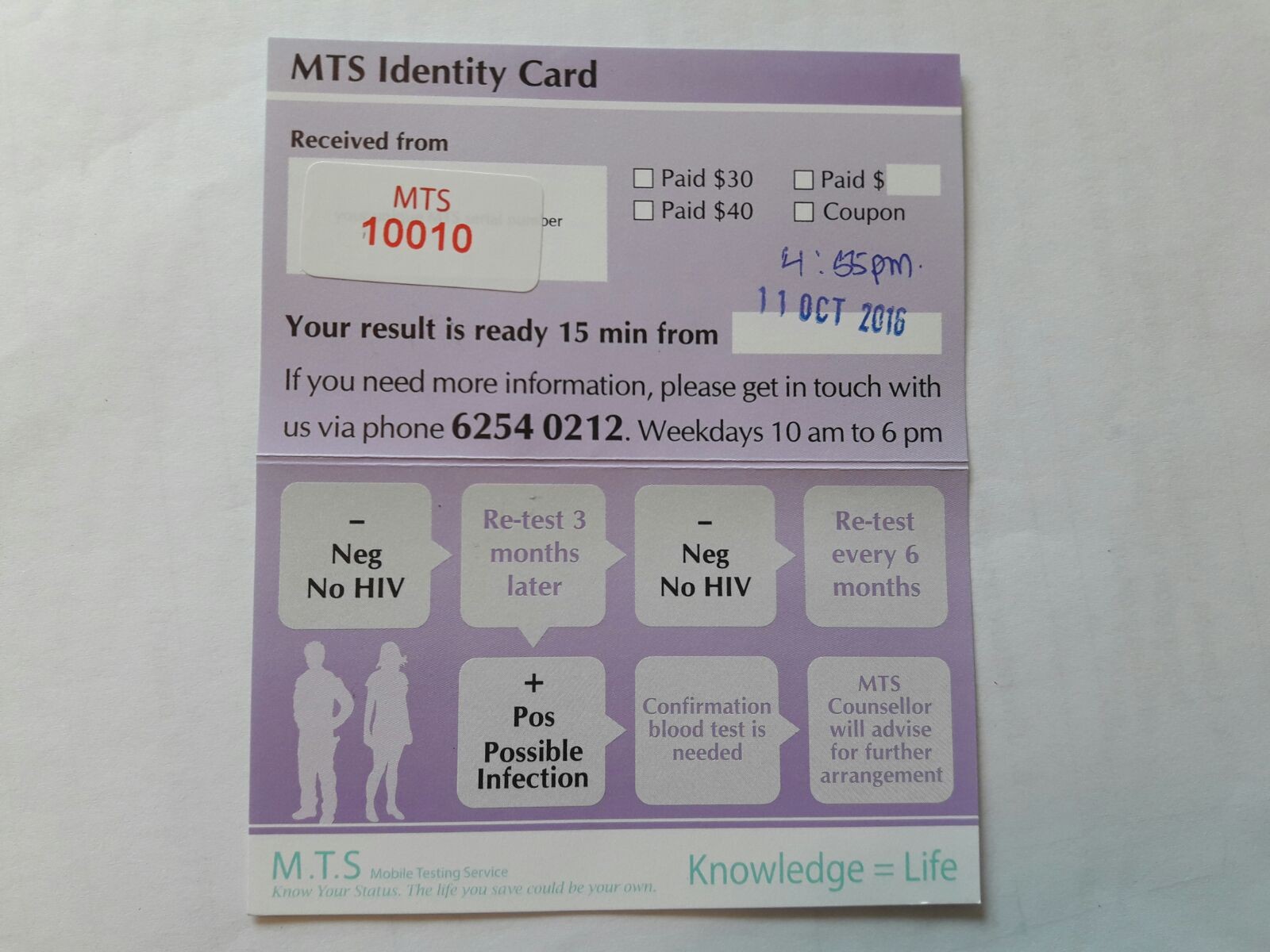Disclaimer: These are only my experiences, and I don’t aim to speak on behalf of everyone who got tested. Your personal experiences may be different from what I describe here, so take the stick out of your butt before you make snap judgements. Blah blah blah, thanks and peace out. -Ann
I went for an anonymous HIV test today.
“Oh, I’m just doing it out of idle curiosity, I’m not even sexually active. Plus, the most hardcore drug I’ve ever done is paracetamol,” I insisted throughout the day. Surely this constant need for clarification says something about the way I look at HIV testing. And judging from the eyebrows that were raised when other people heard of my decision, I’m probably not alone. In fact, my own mother would probably hang me upside down if I ever told her about this, and I’m only half-kidding.
I was so embarrassed to get tested alone that I had to ask a close friend to accompany me. Thankfully, she was kind enough to offer to take the test herself so I didn’t feel so awkward. (Bless her heart.)
So as we approached the Action for Aids (AFA) van, I felt my heart rate accelerate. My footsteps slowed slightly. Even though I knew I had nothing to fear, at the back of my mind, I kept thinking, “What if?”
Strangely enough, HIV’s potential impact on my physical health didn’t bother me quite as much as its impact on my image. Will I lose all my friends if the test came back positive? How can I ever face my family again? And I realised that none of these thoughts would ever occur to me if I were to talk about any other chronic health condition. Imagine how ridiculous it would seem if I told anyone, “Hey, the test results are out, and I’m diabetes-positive. I know it’s bad news, but it’s not like I’ve ever had unprotected sugar-binges… I really hope our friendship doesn’t change!”
But as I reached the testing facility, I saw that there were a couple of people I knew in the queue. On one hand, it was nice to know that I wasn’t alone. But on the other hand, I felt a strong urge to clarify to them that I didn’t really need to test myself, and I was just there out of sheer curiosity. If it wasn’t for my friend, I’d probably have left before anyone saw me. But I pressed on.
Greeting us with a smile, a friendly volunteer handed us some forms to fill up. We had to fill in things like our gender, ethnicity, and sexual history. However, we didn’t have to fill in any personal or contact details, and honestly, the paper work took less than five minutes to complete. Plus, the general atmosphere was very relaxed; there were no signs of judgement from any of the volunteers.
Nonetheless, the wait between the paperwork and the actual test was pretty long. In the 45 minutes that I was in the queue, I tried to chat with my friend, fan off some of the pesky mosquitoes that plagued the area, and even to get some studying done. This helped me to relax and pass time. However, I imagine that if I were alone in the queue, the wait would make me quite anxious.
But eventually, I got into the testing van, where I met two volunteers. One of them pricked my fingers for the test, while the other counsellor asked me some more questions about my (non-existent) sexual encounters. The finger prick did sting, and I may or may not have yelled and/or cried a little. But chat with the counsellor wasn’t awkward at all. It seemed like he genuinely wanted us to feel comfortable, and made sure that I left the van knowing more about HIV transmission, on top of getting tested.
Then, I received a card with a queue-number and was told to wait about 15 minutes for my test results.
During the wait, as the van was parked along a two-way road, I only almost got knocked down by oncoming traffic two or three times. But despite those minor setbacks, I eventually got back my test results, and exhaled the breath that I didn’t even know I was holding. (In case any of you are interested, it was a negative! Just saying.) I then got to talk to another volunteer counsellor for AFA, who was extremely candid about any further questions that I had about the test.
One thing that I found really interesting was the answer he gave my friend, who asked whether low-risk individuals were wasting the volunteers’ time and resources by showing up for the test. He told us that anybody could get tested for HIV, and getting more people tested regularly could actually normalise the procedure and decrease the societal stigma associated with HIV tests. It was a rather enlightening perspective.
As I left the area, I really felt like I had learned many new things about HIV transmission and the work that AFA does. However, I also discovered that I might not be as open and objective about sexual health that I thought I was. I mean, I wouldn’t have felt so shameful and embarrassed of getting tested if I believed otherwise. Still, by acknowledging my irrational fears on such a public domain, I hope I can say that I’ve taken my first step to fighting the stigma associated with HIV.
–
About the Author
Ann Chia is a Year 2 Mechanical Engineering student. A self-professed Renaissance woman, she is fascinated with everything from Maths and Science to art, dance, and sports. She hopes that one day, she will be able to travel the world with her dog and best friend.


Leave a Reply